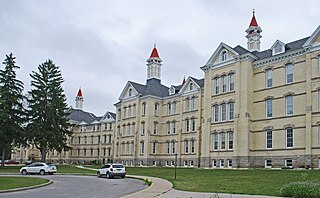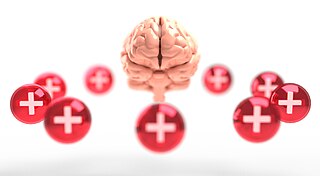
Psychosis is an abnormal condition of the mind that results in difficulties determining what is real and what is not real. Symptoms may include delusions and hallucinations. Other symptoms may include incoherent speech and behavior that is inappropriate for the situation. There may also be sleep problems, social withdrawal, lack of motivation, and difficulties carrying out daily activities. Psychosis in adolescents is a serious medical illness but is not very common.
Outpatient commitment—also called assisted outpatient treatment (AOT) or community treatment orders (CTO)—refers to a civil court procedure wherein a legal process orders an individual diagnosed with a severe mental disorder to adhere to an outpatient treatment plan designed to prevent further deterioration or recurrence that is harmful to themselves or others.

Psychiatric hospitals, also known as mental health hospitals, and mental health units, are hospitals or wards specializing in the treatment of serious mental disorders, such as major depressive disorder, schizophrenia and bipolar disorder. Psychiatric hospitals vary widely in their size and grading. Some hospitals may specialize only in short term or outpatient therapy for low-risk patients. Others may specialize in the temporary or permanent care of residents who, as a result of a psychological disorder, require routine assistance, treatment, or a specialized and controlled environment. Patients are often admitted on a voluntary basis, but people whom psychiatrists believe may pose a significant danger to themselves or others may be subject to involuntary commitment and involuntary treatment. Psychiatric hospitals may also be referred to as psychiatric wards or units when they are a subunit of a regular hospital.

Anti-psychiatry is a movement based on the view that psychiatric treatment is more often damaging than helpful to patients. It considers psychiatry a coercive instrument of oppression due to an unequal power relationship between doctor and patient, and a highly subjective diagnostic process. Wrongful involuntary commitment is an important issue in the movement. It has been active in various forms for two centuries.
Schizoaffective disorder is a mental disorder characterized by abnormal thought processes and an unstable mood. The diagnosis is made when the person has symptoms of both schizophrenia and a mood disorder—either bipolar disorder or depression—but does not meet the diagnostic criteria for schizophrenia or a mood disorder individually. The main criterion for the schizoaffective disorder diagnosis is the presence of psychotic symptoms for at least two weeks without any mood symptoms present. Schizoaffective disorder can often be misdiagnosed when the correct diagnosis may be psychotic depression, psychotic bipolar disorder, schizophreniform disorder, or schizophrenia. It is imperative for providers to accurately diagnose patients, as treatment and prognosis differs greatly for each of these diagnoses.
Edwin Fuller Torrey, is an American psychiatrist and schizophrenia researcher. He is Associate Director of Research at the Stanley Medical Research Institute (SMRI) and founder of the Treatment Advocacy Center (TAC), a nonprofit organization whose principal activity is promoting the passage and implementation of outpatient commitment laws and civil commitment laws and standards in individual states that allow people diagnosed with mental illness to be forcibly committed and medicated easily throughout the United States.

Mental health is the level of psychological well-being or an absence of mental illness. It is the state of someone who is "functioning at a satisfactory level of emotional and behavioral adjustment". From the perspectives of positive psychology or of holism, mental health may include an individual's ability to enjoy life and to create a balance between life activities and efforts to achieve psychological resilience. According to the World Health Organization (WHO), mental health includes "subjective well-being, perceived self-efficacy, autonomy, competence, inter-generational dependence, and self-actualization of one's intellectual and emotional potential, among others". The WHO further states that the well-being of an individual is encompassed in the realization of their abilities, coping with normal stresses of life, productive work, and contribution to their community. Cultural differences, subjective assessments, and competing professional theories all affect how one defines "mental health".
The Hearing Voices Movement (HVM) is the name used by organizations and individuals advocating the "hearing voices approach", an alternative way of understanding the experience of those people who "hear voices". In the medical professional literature, ‘voices’ are most often referred to as auditory verbal hallucinations. The movement uses the term ‘hearing voices’, which it feels is a more accurate and 'user-friendly' term.
Psychiatric nursing or mental health nursing is the appointed position of a nurse that specialises in mental health, and cares for people of all ages experiencing mental illnesses or distress. These include: schizophrenia, schizoaffective disorder, mood disorders, anxiety disorders, personality disorders, eating disorders, suicidal thoughts, psychosis, paranoia, and self-harm.

Emergency psychiatry is the clinical application of psychiatry in emergency settings. Conditions requiring psychiatric interventions may include attempted suicide, substance abuse, depression, psychosis, violence or other rapid changes in behavior. Psychiatric emergency services are rendered by professionals in the fields of medicine, nursing, psychology and social work. The demand for emergency psychiatric services has rapidly increased throughout the world since the 1960s, especially in urban areas. Care for patients in situations involving emergency psychiatry is complex.
The trauma model of mental disorders, or trauma model of psychopathology, emphasises the effects of physical, sexual and psychological trauma as key causal factors in the development of psychiatric disorders, including depression and anxiety as well as psychosis, whether the trauma is experienced in childhood or adulthood. It conceptualises victims as having understandable reactions to traumatic events rather than suffering from mental illness.
The psychiatric survivors movement is a diverse association of individuals who either currently access mental health services, or who are survivors of interventions by psychiatry, or who are ex-patients of mental health services.
The Icarus Project was a media and activist endeavor broadly aligned to the anti-psychiatry movement and recovery approach, arguing that mental illness should be understood as an issue of social justice and that a person's mental state can improve through greater social support and collective liberation. It shares similarities with the academic fields of Psychopolitics and Mad Studies. The name is derived from Icarus, a hero in Greek mythology, and is metaphorically used to convey that the experiences of mental distress and other extreme mental states can lead to "potential[ly] flying dangerously close to the sun."
Psychological recovery or recovery model or the recovery approach to mental disorder or substance dependence emphasizes and supports a person's potential for recovery. Recovery is generally seen in this approach as a personal journey rather than a set outcome, and one that may involve developing hope, a secure base and sense of self, supportive relationships, empowerment, social inclusion, coping skills, and meaning. Recovery sees symptoms as a continuum of the norm rather than an aberration and rejects sane-insane dichotomy.
Dual diagnosis is the condition of suffering from a mental illness and a comorbid substance abuse problem. There is considerable debate surrounding the appropriateness of using a single category for a heterogeneous group of individuals with complex needs and a varied range of problems. The concept can be used broadly, for example depression and alcoholism, or it can be restricted to specify severe mental illness and substance misuse disorder, or a person who has a milder mental illness and a drug dependency, such as panic disorder or generalized anxiety disorder and is dependent on opioids. Diagnosing a primary psychiatric illness in substance abusers is challenging as drug abuse itself often induces psychiatric symptoms, thus making it necessary to differentiate between substance induced and pre-existing mental illness.
Center for Mental Health Services (CMHS), also known as community mental health teams (CMHT) in the United Kingdom, support or treat people with mental disorders in a domiciliary setting, instead of a psychiatric hospital (asylum). The array of community mental health services vary depending on the country in which the services are provided. It refers to a system of care in which the patient's community, not a specific facility such as a hospital, is the primary provider of care for people with a mental illness. The goal of community mental health services often includes much more than simply providing outpatient psychiatric treatment.
The National Empowerment Center (NEC) is an advocacy and peer-support organization in the United States that promotes an empowerment-based recovery model of mental disorders. It is run by consumers/survivors/ex-patients "in recovery" and is located in Lawrence, Massachusetts in Essex County.
Will Hall is an American mental health advocate, counselor, writer, and teacher. Diagnosed with schizophrenia, he is a leader in the recovery approach in mental health and is an organizer within the psychiatric survivors movement. Hall advocates the recovery approach to mental illness and is recognized internationally as an innovator in the treatment and social response to psychosis.

In a study in Western societies, homeless people have a higher prevalence of mental illness when compared to the general population. They also are more likely to suffer from alcoholism and drug dependency. It is estimated that 20–25% of homeless people, compared with 6% of the non-homeless, have severe mental illness. Others estimate that up to one-third of the homeless suffer from mental illness. In January 2015, the most extensive survey ever undertaken found 564,708 people were homeless on a given night in the United States. Depending on the age group in question, and how homelessness is defined, the consensus estimate as of 2014 was that, at minimum, 25% of the American homeless—140,000 individuals—were seriously mentally ill at any given point in time. 45% percent of the homeless—250,000 individuals—had any mental illness. More would be labeled homeless if these were annual counts rather than point-in-time counts.
The United States has experienced two waves of deinstitutionalization, the process of replacing long-stay psychiatric hospitals with less isolated community mental health services for those diagnosed with a mental disorder or developmental disability.





